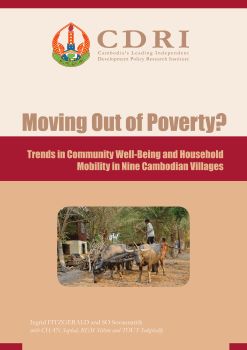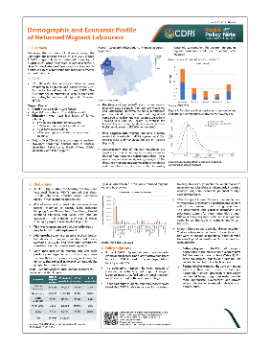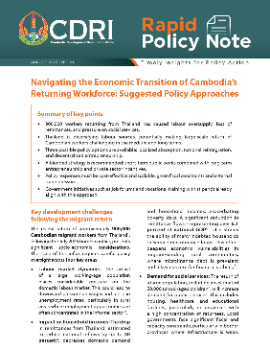
Moving Out of Poverty? Trends in Community Well-Being and Household Mobility in Nine Cambodian Villages
Abstract/Summary
The Moving Out of Poverty Study (MOPS) is a first of its kind in Cambodia, one of 18 studies commissioned by the World Bank to examine poverty dynamics and trends. Conducted in 2004/05, the study revisited nine rural villages in which CDRI had conducted research in 2001, using quantitative and qualitative methods to investigate the extent to which these villages and individual households had been able to move out of poverty and improve prosperity, or had experienced downward mobility and decline.
The study set out to examine: which communities or groups move out of poverty and which remain trapped and why; whether people experience mobility differently in different economic conditions; how and why governance and social networks matter in mobility; what factors explain household and community progress and mobility or decline and stagnation; and the interaction between household and community factors, as well as any variations between villages and types of households.
The study was longitudinal, revisiting households that had previously been included in the 2001 study (using a panel survey) and contextual, exploring local history, geography and trends and their impact on communities and households, and it employed mixed methods, including a household panel survey and in-depth focus group discussions and semi-structured interviews. The nine villages selected for the original 2001 study represent all four of Cambodia’s main rural agro-ecological regions—the Tonle Sap plains, Mekong plains, plateau/mountain region and the coast. The 890 panel households drawn from the nine study villages represent a significant data set, from which statistically valid claims can be made about aggregate and village trends. The panel survey was supplemented by qualitative data from interviews and focus groups with 477 participants from the nine villages, including formal and informal village leaders, mobility groups (with participants who moved into or out of poverty or whose situation remained static) and young men and women.
The framework for analysis involved an examination of the main changes and trends that had affected the study villages, including changes in consumption and incomes and village poverty rates, together with an analysis of the factors contributing to or constraining community development and prosperity and household movement into and out of poverty. The analysis included community factors such as the underlying conditions and development and governance contexts that had shaped the experience of each village, and household factors such as strategies for income generation and the specific vulnerabilities that households experience. Although village and household factors accounting for movement out of poverty or decline and stagnation were explored in detail, individual experience, such as the impact of gender differences on poverty and mobility, was not explored in any depth. As intra-household dynamics are receiving increasing attention in poverty research (Fuwa et al. 2000), this could be a fruitful area for investigation in a further round of the MOPS.



